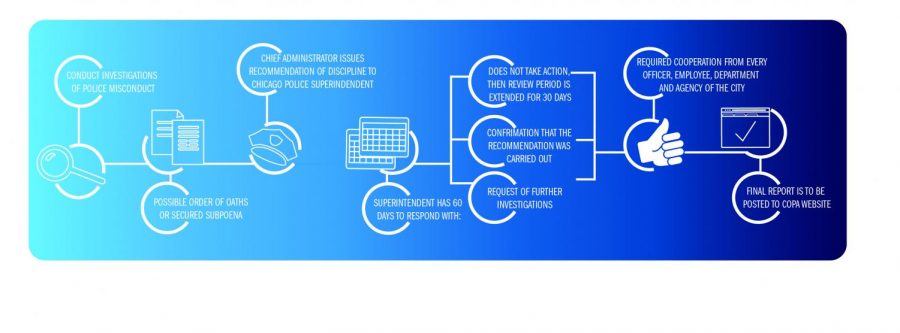Emanuel’s Police Accountability proposal raises questions
Emanuel’s Police Accountability proposal raises questions
September 12, 2016
Legislation authorizing a new agency to investigate police misconduct complaints is pending City Council approval, and the draft has spurred skepticism from local groups.
The Police Accountability Ordinance draft, a months-long project from Mayor Rahm Emanuel and several city aldermen, was launched following the Nov. 19, 2015 release of footage showing the shooting of Laquan McDonald by Chicago Police officer Jason Van Dyke,. The proposal is due to be voted on Sept. 29 at a special council meeting, according to an Aug. 31 mayoral press release.
The proposed ordinance features new policies, procedures and the creation of the Civilian Office of Police Accountability, a new body replacing the Independent Police Review Authority to investigate accusations of police misconduct, and a new Public Safety Deputy with the power to audit the new agency.
Emanuel’s ordinance draft was designed to “ensure investigations of officers are independent, fair, timely and transparent,” as stated in the press release.
This ordinance is part of the evolution of Chicago’s police accountability system, said Douglas Thomson, a professor of criminal justice and sociology at Chicago State University
Unlike the preceding Office of Professional Standards—a former Chicago Police Department unit that investigated accusations of police misconduct—the new body gives greater authority to those conducting investigations.
Thomson said while the process has been “painfully slow,” there may be value in Emanuel’s proposal, including increased authority an subpoena power for COPA.
COPA is designed to be a new and independent review board, but City Hall and the mayor’s office is still very much in control, said Frank Chapman, field organizer for the Chicago Alliance Against Racist and Political Repression.
Chapman, whose activist group pushes for police accountability and civil rights and rejects the ordinance, said it institutes a “sham process” that still leaves City Hall and the mayor’s office in control of the board’s personnel.
Chapman added that he thinks the proposal is not designed to address the controversy and issues of police accountability.
“The only solution to the problem is to give the people the democratic right to decide who polices our communities and how our communities are policed,” Chapman said.
According to the ordinance’s latest draft, the chief administrator of COPA will be the former chief administrator of IPRA, Sharon Fairley. She will be appointed by Emanuel to a four-year term and can be reappointed. The ordinance states the City Council is responsible for selecting future administrators by an unspecified method, and the mayor-appointed Inspector General appoints the new Public Safety Deputy.
This ordinance should not be voted on until concerns regarding funding, appointment and independence of COPA’s attorneys are addressed at a Sept. 29 meeting, according to Thomson.
“[This is] another step in the right direction, but structural issues remain,” Thomson said.
This ordinance is too similar to ones already in existence, according to Louis Silverstein, an associate professor of humanities at Columbia College.
“The [city] need[s] to bring someone in who has no ties to what has occurred before,” Silverstein said.
Draft contributors Alderman Carrie Austin (34th), Alderman Ariel Reboyras (30th), the CPD and the Mayor’s Office could not be reached for comment.








